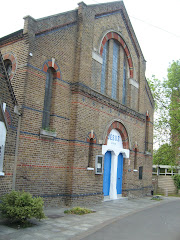In 1855 Harvey's only son was sick and it was thought better air would help. This led eventually to a permanent move to Hampstead in 1861. They began on Haverstock Hill, then, after moving up it once they took up residence in newly built Mount Grove on the then new Greenhill Estate in 1870.
The Baptist James Castleden (1778-1854) had laboured in Hampstead until his death but the only nonconformist chapel at that time appears to have been a high one in both senses - high in its Calvinism and high in its location - at the top of Holly Bush Hill. Harvey resolved, partly as thanks to God for his son's refound health, to build new Baptist chapel but the people of the area were poor and there was no place for it anyway. It was another four years before they obtained the land - used a former fruit and vegetable garden. A committee was formed to plan a building but it was too expensive and so the committee was dissolved. However, at long last, on June 4, 1860 Harvey signed a contract to a build chapel with other buildings at the cost of £4,800. It was not built at his sole cost, others did give, but he was a generous contributor. The Heath Street building opened in July, 1861 (see pic). Harvey became a member there and was generous provider for the work. They called William Brock Junior, the son of Dr Brock, to be their first pastor. Typically, the the intention was that the membership would be "open to all who love our Lord Jesus Christ in truth and sincerity" with true believers being baptised by immersion.
Soon there was also a Devon born assistant minister there called William Rickard. He was instrumental in starting the Baptist work in nearby Childs Hill. Although not constituted as a church until 1877, they were able to put up a building in 1870. The inscription has long disappeared but it was Harvey who laid the foundation stone for the new building on July 28, 1870.
At the end of 1865 the London Baptist Association was formed. Unsurprisingly, Harvey was its first treasurer. He served for 16 years, until 1881. In 1870 he offered to help defray debts of many chapels. The idea was that if they paid one third by the end of 1871 he would give 10% of the remainder. He ended up parting with some £500 by this means.
An example of another cause that he helped was the Shoreditch Tabernacle, where William Cuff ministered, which was developed in the 1880s. The meeting on December 1, 1876 held in Harvey's Hampstead drawing room where it became clear that the new building could be financed was one of great joy to Cuff and the deacon who accompanied him.
Harvey felt a duty, according to his son, to give an example but also tried to conceal much of his giving. In 1867 Harvey's good friend C H Spurgeon wrote asking for contribution to Stockwell Orphanage, a work that had then recently begun. Harvey gave £600 to pay for the second house, which was called The Merchant's House.
A letter of July 16, 1867, acknowledges the gift. “You find it more easy to perform noble actions than I do to thank you for them” wrote Spurgeon. A similar sum was given by Harvey for the girls' orphanage 13 years later.
Another example of his kindness through Spurgeon was the way in the Summer of 1876 he sent him £100 to pass on anonymously to ministers in need of a summer holiday. Spurgeon wrote back, passing on the letters thanking Spurgeon himself and acknowledging where the thanks should have gone. In 1882 a gift for the Baptist work in East India Dock produced very thankful letter.
Harvey was also a great supporter of the Baptist Missionary Society. In 1881 he called on supporters of the mission to make 1882 a year of Jubilee. He urged each one to see himself as “the steward not the irresponsible owner of the manifold gifts of God”.
It was only a sort time into 1893 that, on February 9, after two days' illness he rather suddenly died at home, in his sixty-seventh year.
In his little book on his father and using his favourite turn of phrase Alfred Harvey wrote of his father “Never was there a man more naturally modest and unpretentious than he. His unassuming geniality and consideration for others was the same in whatever company he was ....”. he was a man of buoyant spirits. A writer in the Freeman of February 16, 1883 observed how Harvey “had a rare confidence in his own powers ...” taking up various pursuits, “singing ... preaching to the poor ...” and his apologetics work an mastering them. He was a “keen sportsman” “a jocund traveller”. The writer in the Freeman commented “I cannot conceive of Mr Harvey doing anything by halves”. He was paradoxically “devoid of personal ambition, and yet he was ambitious”. He sought “no satisfaction save success” and never rested on his laurels.




